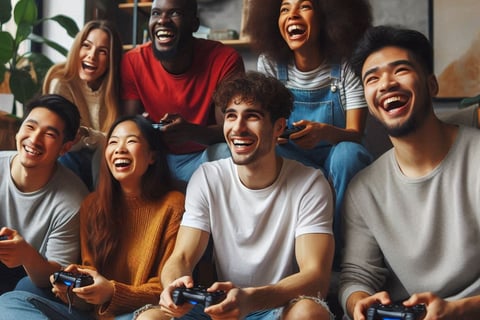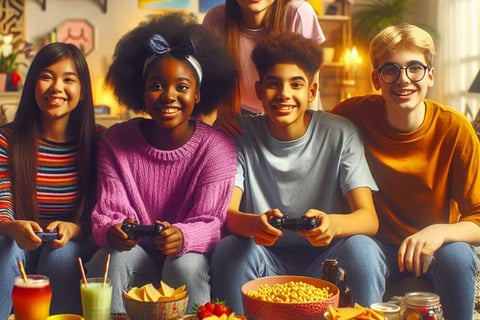The Psychology of Games: How Gaming Affects the Human Mind
Gaming is a fascinating and powerful tool that affects the human mind in countless ways. From cognitive benefits and emotional relief to social connections and immersive experiences, video games offer unique psychological experiences. However, like any activity, moderation is key. By understanding the psychology behind gaming, players can maximize the benefits while avoiding potential pitfalls. As technology continues to evolve, the role of gaming in shaping human behavior and society will only grow.
PSYCHOLOGY
kanav pareek
2/6/20259 min read


Gaming isn’t just entertainment—it’s a psychological phenomenon. Whether we’re solving puzzles, competing in multiplayer battles, or exploring vast virtual worlds, games deeply influence our thoughts, emotions, and behaviors. But how exactly do games affect our minds? And why are they so engaging?
Understanding the psychology behind gaming can help us see the benefits, recognize potential risks, and even apply gaming principles in real life. This article explores the fascinating connection between gaming and human psychology, covering everything from cognitive benefits to the impact of game design.
The Science Behind Gaming Psychology
How the Brain Responds to Gaming
When we play games, our brains light up in fascinating ways. Games activate multiple regions of the brain, including:
The Prefrontal Cortex – Responsible for decision-making and strategic thinking.
The Hippocampus – Essential for memory formation and spatial navigation.
The Amygdala – Processes emotions like excitement, frustration, and fear.
Gaming engages these brain areas in unique ways, keeping us immersed and invested in the experience.
The Role of Dopamine and Rewards
One of the biggest reasons games are so engaging is dopamine, the brain’s "feel-good" neurotransmitter. When we achieve a goal in a game—whether it’s leveling up, unlocking a new item, or winning a match—our brains release dopamine, reinforcing the behavior and making us want to keep playing.
Game developers design reward systems carefully, using elements like:
Variable Rewards – Randomized rewards (like loot boxes) keep players hooked.
Progression Systems – Leveling up or unlocking new abilities keeps players engaged.
Challenges and Achievements – Completing difficult tasks gives a sense of accomplishment.
This cycle of reward and reinforcement is what makes games so addictive—but also why they can be beneficial for learning and motivation.
Cognitive Benefits of Gaming
Improved Problem-Solving Skills
Many games require critical thinking and quick decision-making. Strategy games like Chess, Age of Empires, and Starcraft demand players to:
Analyze situations quickly
Formulate and execute strategies
Adapt to changing circumstances
Puzzle games like Portal and Tetris improve logical reasoning and spatial awareness, training the brain to recognize patterns and find solutions efficiently.
Enhanced Memory and Cognitive Flexibility
Playing video games can strengthen memory and improve multitasking skills. Role-playing games (RPGs) and open-world games require players to remember:
Maps and locations
Storylines and character interactions
Inventory management and crafting recipes
Studies show that gamers often have better working memory and cognitive flexibility, meaning they can switch between tasks more efficiently than non-gamers.
The Impact of Gaming on Emotions
Stress Relief and Relaxation
Gaming provides an escape from daily stress. Many players use games to unwind after a long day, engaging in relaxing activities like:
Exploring open worlds (The Legend of Zelda: Breath of the Wild)
Playing casual puzzle games (Candy Crush, Stardew Valley)
Engaging in meditative experiences (Journey, Abzû)
These games help reduce cortisol levels (the stress hormone), promoting relaxation and emotional well-being.
How Games Evoke Emotions
Games are powerful storytelling tools. A well-crafted game can make players feel:
Excitement – Competitive games create adrenaline rushes.
Empathy – Emotional storytelling in games like The Last of Us makes players deeply invested.
Fear and Suspense – Horror games like Resident Evil and Silent Hill use psychological techniques to build tension.
These emotional responses make gaming a deeply engaging experience that goes beyond simple entertainment.


Social Aspects of Gaming
Multiplayer and Social Bonding
Gaming has evolved from a solitary pastime into a highly social experience. Multiplayer games like Fortnite, Call of Duty: Warzone, and Minecraft allow players to connect with friends or even make new ones across the world. These interactions foster teamwork, collaboration, and even leadership skills.
Many games require coordinated efforts between players, whether it’s strategizing in a battle royale or solving puzzles in cooperative adventures. This shared experience strengthens social bonds, providing a sense of belonging and community.
The Role of Online Communities
Beyond multiplayer gaming, online communities on platforms like Discord, Reddit, and Twitch provide spaces for gamers to interact. These communities offer:
Support Networks – Players share experiences, tips, and advice.
Friendship and Social Engagement – Gamers find like-minded individuals with shared interests.
Collaborative Play – Group challenges and guilds encourage teamwork.
For many, gaming isn’t just about playing—it's about being part of something bigger.
The Dark Side of Gaming Psychology
While gaming offers numerous benefits, there are also psychological risks associated with excessive play.
Addiction and Compulsive Gaming Behavior
Gaming addiction is a real concern, with some players struggling to control their gaming habits. Symptoms of compulsive gaming include:
Neglecting Responsibilities – Prioritizing games over work, school, or relationships.
Sleep Deprivation – Staying up late to play, leading to physical exhaustion.
Mood Swings – Irritability or frustration when unable to play.
Games that use psychological tricks—such as daily login rewards or infinite progression loops—can encourage compulsive behavior. Recognizing these patterns is crucial for maintaining a healthy balance.
The Impact of Violent Games on Aggression
A long-debated topic in psychology is whether violent video games contribute to aggressive behavior. While studies suggest that short-term exposure to violent games may increase aggressive thoughts, there is no definitive proof that it leads to real-world violence.
However, some factors can influence how violent games affect individuals:
Personality Traits – Players with pre-existing aggression may be more affected.
Parental Guidance – Supervision and discussions about game content help mitigate negative effects.
Context and Intent – Playing violent games in a fun, social setting differs from playing them in isolation.
Understanding the difference between fantasy and reality is key to ensuring that gaming remains a positive experience.
The Role of Gamification in Daily Life
Gamification is the process of applying game mechanics to non-gaming situations. Businesses, schools, and even fitness programs use gamification to enhance engagement and motivation.
How Gaming Principles Influence Education
Gamification in education makes learning more interactive and enjoyable. Some examples include:
Duolingo – Uses points, streaks, and rewards to encourage language learning.
Kahoot! – Transforms quizzes into fun, competitive challenges.
Minecraft: Education Edition – Teaches problem-solving and teamwork through creative building.
Students are more likely to stay engaged when learning feels like a game, making gamification a powerful educational tool.
Gamification in Workplace Productivity
Many businesses implement gamification to boost employee motivation and performance. Techniques include:
Leaderboards and Points Systems – Encouraging healthy competition.
Rewards and Badges – Recognizing achievements and milestones.
Challenges and Goals – Keeping employees focused and motivated.
These strategies make work more engaging, increasing efficiency and job satisfaction.
Psychology of Game Design
Game developers use psychological principles to design compelling and immersive experiences.
How Developers Use Psychology to Make Games Engaging
To keep players invested, game designers incorporate:
Progression Systems – Unlockable content and achievements provide motivation.
Artificial Scarcity – Limited-time events create urgency and excitement.
Loss Aversion – The fear of losing progress encourages continued play.
These elements tap into our psychological instincts, making games difficult to put down.
The Importance of Flow State in Gaming
The "flow state" is a psychological concept where a person is fully immersed in an activity. Games are designed to induce this state by balancing challenge and skill level.
A game that is too easy becomes boring, while one that is too hard causes frustration. Successful game design keeps players in a state of flow, where they are challenged just enough to stay engaged without feeling overwhelmed.
The Effect of Gaming on Decision-Making
Risk-Taking Behavior in Games
Many games require players to make split-second decisions. This can impact real-life risk assessment and decision-making skills.
Strategy Games – Teach players to anticipate consequences and weigh options.
Survival Games – Encourage resource management and long-term planning.
Competitive Games – Enhance reaction time and adaptability.
While gaming can improve decision-making skills, excessive exposure to high-risk situations in games may desensitize some players to real-world risks.
How Gaming Affects Real-World Choices
Games can influence real-life behaviors and preferences. For example:
Players of simulation games (like The Sims or Cities: Skylines) often develop better organizational skills.
Competitive gamers may develop sharper analytical and problem-solving abilities.
Exposure to cooperative games fosters teamwork and leadership qualities.
By understanding these influences, players can harness gaming experiences to improve real-life decision-making.


How Gaming Shapes Identity and Self-Perception
Role-Playing and Personal Identity in Gaming
Video games offer players a chance to step into different roles, whether as a brave warrior, a cunning strategist, or a compassionate healer. Role-playing games (RPGs) like The Elder Scrolls, Final Fantasy, and Mass Effect allow players to make choices that shape their characters, influencing how they perceive themselves.
Many players develop a strong emotional connection to their in-game avatars, leading to:
Increased Self-Expression – Games provide a platform for creativity and identity exploration.
Stronger Empathy – Playing different roles helps players understand different perspectives.
Confidence Boost – Achieving success in a game can translate into increased self-esteem in real life.
Games can serve as a safe space for self-exploration, allowing players to experiment with different aspects of their personality.
Self-Esteem and Virtual Achievements
Accomplishments in video games—whether winning a tournament, completing a difficult mission, or unlocking rare items—can significantly impact self-esteem. Players experience a sense of progress and achievement, which can be especially important for individuals who struggle with confidence in other areas of life.
However, it’s important to maintain a balance between virtual and real-world accomplishments to avoid becoming overly reliant on gaming for self-worth.
Gaming and Mental Health
How Games Help with Anxiety and Depression
Certain types of games can provide psychological relief for those dealing with anxiety, depression, or stress. Games can help in the following ways:
Escapism and Relaxation – Open-world and casual games provide a break from reality.
Social Connection – Online multiplayer games help combat loneliness.
Cognitive Stimulation – Puzzle and strategy games keep the mind engaged and active.
Studies have shown that playing games like Animal Crossing, Stardew Valley, and Celeste can provide emotional comfort and stress relief.
The Risks of Excessive Gaming on Mental Well-Being
While gaming can be beneficial, excessive play can negatively impact mental health. Some risks include:
Social Isolation – Spending too much time gaming can reduce real-world social interactions.
Sleep Disruptions – Late-night gaming sessions can interfere with sleep quality.
Increased Anxiety – Competitive games can create stress and frustration.
Understanding personal limits and taking breaks can help maintain a healthy relationship with gaming.
The Impact of Gaming on Children and Adolescents
Educational Benefits and Cognitive Development
Gaming can be a valuable learning tool for children, improving:
Hand-Eye Coordination – Action games enhance motor skills.
Problem-Solving Skills – Puzzle and adventure games encourage critical thinking.
Creativity – Sandbox games like Minecraft allow kids to express their creativity.
Educational games, such as Math Blaster and Brain Age, are specifically designed to help children learn in a fun and interactive way.
Parental Concerns and Setting Healthy Boundaries
Many parents worry about their children's gaming habits. To ensure a positive gaming experience, parents can:
Set Time Limits – Encourage moderation by limiting screen time.
Choose Age-Appropriate Games – Use rating systems like ESRB or PEGI to select suitable content.
Encourage Offline Activities – Balance gaming with outdoor play, reading, and family time.
When managed properly, gaming can be a fun and enriching part of a child’s development.
Virtual Reality and the Future of Gaming Psychology
How VR Affects Perception and Behavior
Virtual reality (VR) gaming takes immersion to the next level, tricking the brain into believing it’s inside the game world. This has powerful psychological effects, including:
Stronger Emotional Reactions – VR can make horror games scarier and adventure games more thrilling.
Empathy Development – VR experiences like VRChat and The Journey allow users to step into another person’s shoes.
Enhanced Learning – VR training simulations are used in medicine, aviation, and military training.
Psychological Risks and Benefits of Immersive Gaming
While VR offers exciting possibilities, it also comes with potential risks:
Motion Sickness – Some users experience dizziness and nausea.
Detachment from Reality – Overuse of VR can blur the line between real and virtual life.
Sensory Overload – Highly immersive experiences can be overwhelming for some players.
As VR technology advances, understanding its psychological impact will be crucial for responsible gaming.
Balancing Gaming with Real Life
Tips for Maintaining a Healthy Gaming Habit
To enjoy gaming while maintaining a balanced lifestyle, consider these strategies:
Set Gaming Time Limits – Avoid excessive play by scheduling breaks.
Engage in Physical Activity – Balance screen time with exercise.
Prioritize Responsibilities – Ensure work, school, and social life are not neglected.
Practice Mindful Gaming – Be aware of emotional responses to gaming and adjust habits if necessary.
How to Identify When Gaming Becomes Problematic
It’s important to recognize signs of unhealthy gaming habits, such as:
Neglecting daily responsibilities
Feeling anxious or irritable when not playing
Experiencing sleep disturbances
Losing interest in non-gaming activities
If gaming starts interfering with daily life, taking a step back and reassessing habits can help restore balance.
Conclusion
Gaming is a fascinating and powerful tool that affects the human mind in countless ways. From cognitive benefits and emotional relief to social connections and immersive experiences, video games offer unique psychological experiences.
However, like any activity, moderation is key. By understanding the psychology behind gaming, players can maximize the benefits while avoiding potential pitfalls. As technology continues to evolve, the role of gaming in shaping human behavior and society will only grow.
Frequently Asked Questions (FAQs)
1. Can video games really improve cognitive skills?
Yes! Studies show that gaming enhances problem-solving, memory, and multitasking skills. Strategy and puzzle games, in particular, help develop cognitive flexibility.
2. Is gaming addiction a real condition?
Yes, excessive gaming can lead to compulsive behaviors. The World Health Organization (WHO) recognizes "gaming disorder" as a mental health condition when it interferes with daily life.
3. Do violent video games make people more aggressive?
While some studies suggest short-term increases in aggression, there is no strong evidence linking violent video games to real-world violence. Personality traits and environmental factors play a bigger role.
4. How can parents ensure their children play games responsibly?
Parents can monitor content using rating systems, set time limits, and encourage a balance between gaming and other activities. Open communication about gaming habits is also important.
5. What is the future of gaming psychology?
With advancements in VR and AI, gaming psychology will continue to evolve. Researchers will explore new ways games influence behavior, emotions, and mental health in the coming years.
Blog
Content
Engage
contact@growthtimewithme.com
© 2024. All rights reserved.
